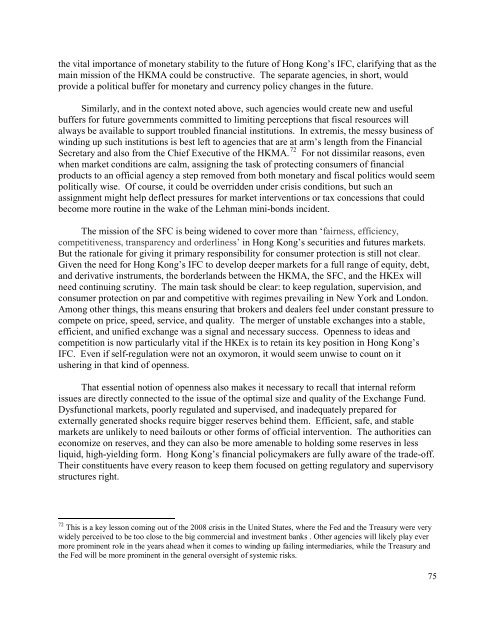Hong Kong's International Financial Centre: Retrospect and Prospect
Hong Kong's International Financial Centre: Retrospect and Prospect
Hong Kong's International Financial Centre: Retrospect and Prospect
Create successful ePaper yourself
Turn your PDF publications into a flip-book with our unique Google optimized e-Paper software.
the vital importance of monetary stability to the future of <strong>Hong</strong> Kong’s IFC, clarifying that as the<br />
main mission of the HKMA could be constructive. The separate agencies, in short, would<br />
provide a political buffer for monetary <strong>and</strong> currency policy changes in the future.<br />
Similarly, <strong>and</strong> in the context noted above, such agencies would create new <strong>and</strong> useful<br />
buffers for future governments committed to limiting perceptions that fiscal resources will<br />
always be available to support troubled financial institutions. In extremis, the messy business of<br />
winding up such institutions is best left to agencies that are at arm’s length from the <strong>Financial</strong><br />
Secretary <strong>and</strong> also from the Chief Executive of the HKMA. 72<br />
For not dissimilar reasons, even<br />
when market conditions are calm, assigning the task of protecting consumers of financial<br />
products to an official agency a step removed from both monetary <strong>and</strong> fiscal politics would seem<br />
politically wise. Of course, it could be overridden under crisis conditions, but such an<br />
assignment might help deflect pressures for market interventions or tax concessions that could<br />
become more routine in the wake of the Lehman mini-bonds incident.<br />
The mission of the SFC is being widened to cover more than ‘fairness, efficiency,<br />
competitiveness, transparency <strong>and</strong> orderliness’ in <strong>Hong</strong> Kong’s securities <strong>and</strong> futures markets.<br />
But the rationale for giving it primary responsibility for consumer protection is still not clear.<br />
Given the need for <strong>Hong</strong> Kong’s IFC to develop deeper markets for a full range of equity, debt,<br />
<strong>and</strong> derivative instruments, the borderl<strong>and</strong>s between the HKMA, the SFC, <strong>and</strong> the HKEx will<br />
need continuing scrutiny. The main task should be clear: to keep regulation, supervision, <strong>and</strong><br />
consumer protection on par <strong>and</strong> competitive with regimes prevailing in New York <strong>and</strong> London.<br />
Among other things, this means ensuring that brokers <strong>and</strong> dealers feel under constant pressure to<br />
compete on price, speed, service, <strong>and</strong> quality. The merger of unstable exchanges into a stable,<br />
efficient, <strong>and</strong> unified exchange was a signal <strong>and</strong> necessary success. Openness to ideas <strong>and</strong><br />
competition is now particularly vital if the HKEx is to retain its key position in <strong>Hong</strong> Kong’s<br />
IFC. Even if self-regulation were not an oxymoron, it would seem unwise to count on it<br />
ushering in that kind of openness.<br />
That essential notion of openness also makes it necessary to recall that internal reform<br />
issues are directly connected to the issue of the optimal size <strong>and</strong> quality of the Exchange Fund.<br />
Dysfunctional markets, poorly regulated <strong>and</strong> supervised, <strong>and</strong> inadequately prepared for<br />
externally generated shocks require bigger reserves behind them. Efficient, safe, <strong>and</strong> stable<br />
markets are unlikely to need bailouts or other forms of official intervention. The authorities can<br />
economize on reserves, <strong>and</strong> they can also be more amenable to holding some reserves in less<br />
liquid, high-yielding form. <strong>Hong</strong> Kong’s financial policymakers are fully aware of the trade-off.<br />
Their constituents have every reason to keep them focused on getting regulatory <strong>and</strong> supervisory<br />
structures right.<br />
72 This is a key lesson coming out of the 2008 crisis in the United States, where the Fed <strong>and</strong> the Treasury were very<br />
widely perceived to be too close to the big commercial <strong>and</strong> investment banks . Other agencies will likely play ever<br />
more prominent role in the years ahead when it comes to winding up failing intermediaries, while the Treasury <strong>and</strong><br />
the Fed will be more prominent in the general oversight of systemic risks.<br />
75


